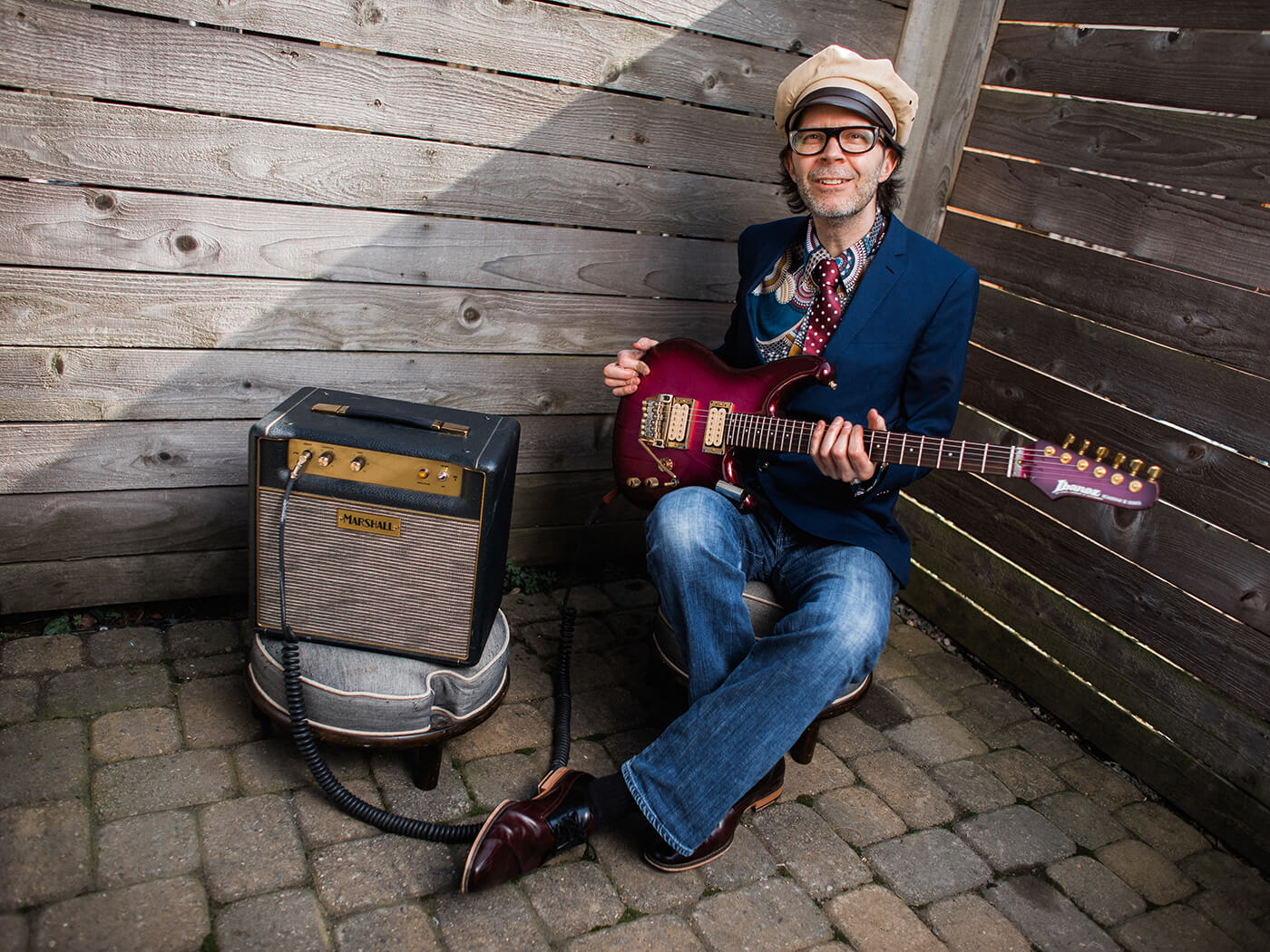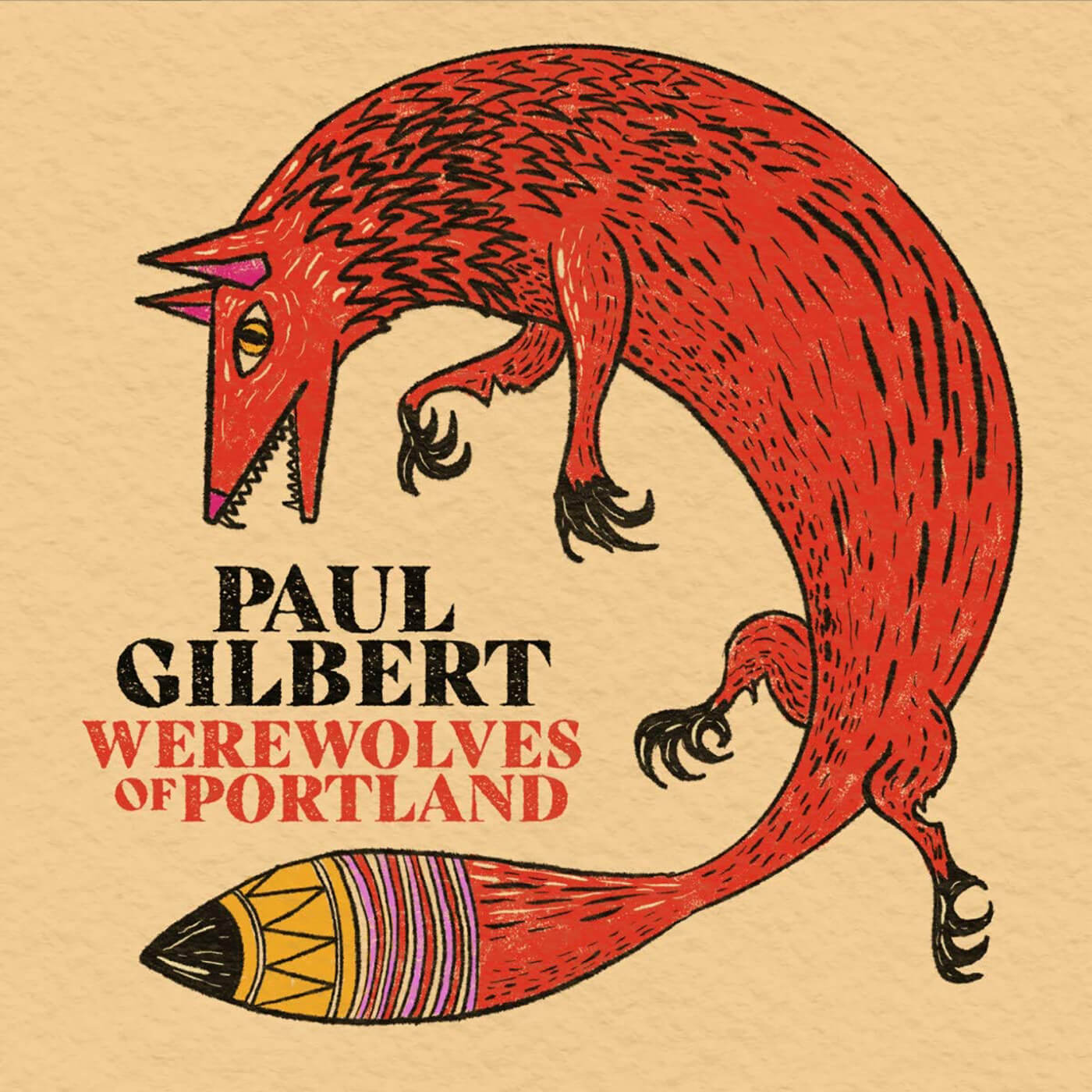“Instructional videos can be boring. I’m always just trying to keep people from walking out the door!”: Paul Gilbert
The shred guitar icon on why he played every instrument on his new album, Werewolves of Portland, the pressure to do something new, and why he’s always trying to keep people engaged, even if you have to get out a pick-drill to do it.

Image: Jason Quigley
You don’t really interview Paul Gilbert; you interview Paul and his guitar, because there’s not a moment of our conversation where the shred legend doesn’t have a guitar sat in his lap. It’s not just a visual presence either, for practically every question we ask the answer is peppered with musical examples, while Paul himself demonstrates himself to be a guitar jukebox – there simply doesn’t seem to be an iconic riff or melody that he’s unable to pull out of the hat, in the blink of an eye.
This amiable musical approach to life and a pure unadulterated love of guitar is what makes Paul such a respected tutor. Indeed, it’s this aspect of his profession that has kept him busy during the last 18 gig-less months. Since 2012, Paul has operated his own online Rock Guitar School, whereby students can study and exchange videos and have Paul critiques their playing then respond with his own video. It has proved enormously successful and has been running for almost a decade.
But the yearn to create is never fully kept at bay with Paul. However, recording a new album during a global pandemic was always going to be tricky for Paul given that he prefers to record live with a band. So, the only option would be to postpone recording until COVID related restrictions are lifted, right? Wrong.
Undeterred, Paul, a modestly accomplished drummer, keyboardist, and bass player, decided to pick up a set of sticks, a bass guitar, and a piano stool (not simultaneously of course) and lay down the entire rhythm section himself. A few short months later Werewolves of Portland was completed – Paul’s 16th solo album and arguably his most accomplished to date.
As ever, its difficult to pigeonhole stylistically: throughout the 10 tracks there’s elements of rock, pop, metal and everything in between, but at the forefront is Paul’s identifiable sense of melody, quickfire pentatonic lines, and the slide playing which has become a significant component of his technical repertoire in the last few years.

Werewolves Of Portland is another instrumental album – are you finished with singing?
“My voice… well, it’s not a really reliable instrument! Sometimes I can get something good out of it, sometimes not. But the guitar is pretty reliable every time I pick it up. I like what comes out of it because I’m playing melodies a lot and it’s nice to have a high note if you need it. Not only a high note, but a good sounding high note. I can hit high notes with my voice but it sounds like Mickey Mouse! I can only get it with falsetto and when I think of falsetto I think of The Bee Gees. I can get more of an attack and more control with a guitar than I can with my voice.”
Did you miss recording live with the band?
“With live stuff, it’s nice because I can sit close to the drummer and it’s just nice not to a have a click. When everybody’s playing together, it just almost always feels good. Even mistakes feel good because everybody’s together! You have these cool things happen – everybody just got excited for a minute and it speeds up – and it’s okay you know, because everybody did it together. As long as you’re together, it’s alright! As soon as you have to overdub, the click becomes the master and you can’t speed up. You have to hold yourself to that click a little more.”

There is a very ‘live’ feel to the album – did you record to a click?
“You have to. The only way I could get around it would be if I just played the drums and was such a good drummer that I could lay down the whole song without a click. But I’m not that good of a drummer! Almost every track I would record the drums, do about 10 takes. By the time we got to take 10 I was playing it pretty good, and we’d go through it and we’d have to move some of the kick drums around because I was totally out of practise. We’d have to spend about an hour fixing my performance – the kick drum is probably a little rushed here and there, I might need a grab a fill from another take because I messed up the fill. It took some fixing!”
Did you strive toward or have any techniques to ensure that the recordings had this ‘band’ feeling?
“I really wrote the songs, overall, melody first. If you’ve got the melody in mind, it’s easier to know what to do dynamically and all the choices you make are like, ‘How do we make the melody work?’ I think that’s the problem with the way I grew up – I grew up with riff rock. I grew up listening to Led Zeppelin and bands where the guitar player probably came up with some awesome riff, and then the poor singer had to finger out how to squeeze inside of it. David Lee Roth was a genius – Eddie Van Halen coming up with these amazing guitar riffs and Dave’s gotta go, ‘How can I get a melody in there?’ He was amazing at that. I don’t have the character of a David Lee Roth, I don’t have the range of a Sammy Hagar, so I rely much more on having a melody that’s like a more traditional melody. It’s got notes, it’s got rhythm, there’s nothing weird going on!

There are lots of tempo changes and while a lot of the song structures don’t sound unusual, when analysed they very much are.
“It’s unusual for a rock guitar player, but it’s very traditional in terms of how a song is usually written. A song is usually a lyric, a melody, whatever the chords are. A lot of the rock stuff I grew up with is kinda upside down in terms of how it’s written. You have to give credit to the Robert Plants of the world because they were able to take that upside down process and still make it work because they were just so good.
“But it’s so much easier to write melody first – you tend to get music that is more traditional. Lately I’ve been revisiting early Iron Maiden stuff like the Killers album [starts playing the riff to Wrathchild], and I imagine that’s such a strong riff that it was probably written first. But also the melodies are the pretty cool and the lyrics are great – you have to wonder!”

Very rarely will we hear a ‘depressing’ Paul Gilbert song! Is the music you write a reflection of your positive personality?
“To me it’s okay for writers and musicians to do what comes naturally: that’s why you like them, they are being themselves. To me that’s your ultimate obligation. In terms of marketing yourself – which you have to do more and more of nowadays – it’s very tempting to go like, ‘Well I know if I play something that sounds like Mr Big all the Mr Big fans are going to be happy’. It’d be nice to make them happy but at the same time I think what people really want in a musician is somebody who’s true to themselves, and sort of telling the truth with their music. I almost feel like I’ve gotta do something new.”
You’re obviously now much better known for your sliding playing. Did you get into that style to better emulate vocal inflections?
“I think the reason I got into it was it started to sound better. I’ve always been a horrible slide player, and it was by accident that I started using my middle finger, because I always used my third finger before and I could never get it working. I think it was a combination of that finger working for me, and the fact I spent a lot more time with blues melodies. Trying to play a scale with slide is terrible, it just sounds weird, but it made more sense with those kind of [vocal] melodies.”

You still spend a great deal of your time teaching, which you’re obviously really passionate about. What is your approach to teaching?
“I have two thoughts: the first thing I wanna do is that I wanna make them play like me, and then once in a while I’ll hear somebody who’s really good at playing like me, and then I’ll go, ‘Uh oh!’ Nothing to do with competition; it’s just they need to find themselves. And so I kinda go back and forth between those things. When I say, ‘Play like me’, I’ve got a lot of solutions to technical problems and I’ll use my own solution. But at the same time at any point I’m willing to go, ‘Ignore everything I just said!’
“With everybody, I get on their case about vibrato. There was one student I had and they were working at it: getting better, but it was a slow road. One day they send a video and they said, “I played a melody, because I know you’re into that” and they decided to do all vibrato with the whammy bar. It was awesome! It sounded so much better than when they try to do it like I do. I never do it the ‘surf’ way but it sounded wonderful. If it sounds good, it is good! I really do have a ton of solutions, I can help people in so many ways, but I have to be careful that I’m not churning out little Paul Gilbert robots! I just wanna give them some tools and say, “take these and build your own stuff!”
Are you aware of how influential your ‘Intense rock’ instructional REH videos were?
“Because I teach a lot, people will come in and they’ve decided that that’s their world. Their main goal is, ‘I just wanna play up and down a scale really fast and perfectly – can you please help me do it?’ That’s a really hard thing for me. I spent an amount of time doing that myself, and it wasn’t even because I wanted to do it; it was because I just found that I could. After doing that for a couple of years, it was like man, I’m getting sick of hearing this! I started looking for other things to play, and to me that’s one of the best pieces of advice or secrets of musicians that sound good. They just found something that they could do, and then like, did it! It’s like – I tried a bunch of stuff, hardly anything worked, but this one thing did. And that I’m going to polish into something amazing.”
How on earth did you convince REH to include all those quirky ideas such as magician tricks and cheerleaders in a guitar instructional video?
“At first they were like there’s no way: you’re not gonna have time to edit this, it’s too crazy. This was before computers, so I shot everything: I had the whole thing mapped out in my head, and there was time code on the VHS tape. And I just watched everything and wrote down all the edit numbers, and then came in the studio and they were like, ‘I think we better book two days in the studio’, and we got it done in time for dinner. They couldn’t believe it! It really came together easily, just because I had nothing else to do! I didn’t have a girlfriend or a family; I just wake up in the morning and work.
“The cheerleaders really were great. I would ask them to do the phrase, then they’d like kinda have a meeting and say, ‘Okay, we could do this’ and they brought some creativity to it. Instructional videos can get boring, anything can get boring, so I’m always just trying to keep people from walking out the door!”
Werewolves of Portland is out now.
